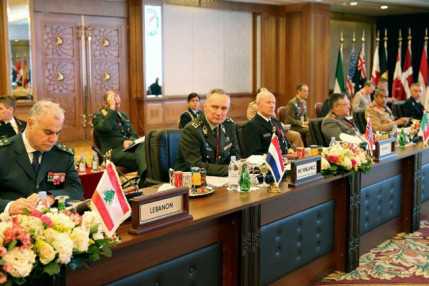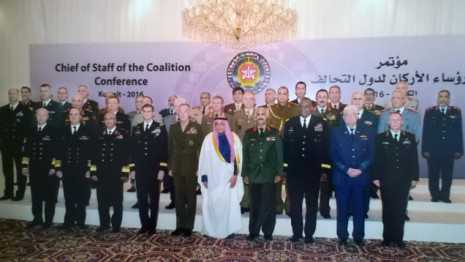Anti-ISIL Conference in Kuwait
Szöveg: General Staff | 2016. február 26. 9:00Hungarian Chief of Defence Gen. Dr. Tibor Benkő attended the Chief of Staff Coalition Conference held on Monday, 22 February in Kuwait. The meeting brought together chiefs of defence from countries participating in the international coalition against the Islamic State.
Last year the international coalition against the Islamic State managed to put the terrorist organization under pressure in Syria and Iraq, and on a global level as well. At the same time, ISIL still keeps large areas and significant economic resources under control, although, since May 2015, it has not won any victories on the battlefields in Syria and Iraq. Since the start of the operations led by the international coalition, more than ten major cities have been liberated from ISIL/Daesh occupation.

Based on the topics of discussion at the conference, the chiefs of defence agreed that the most important tasks are to stabilize and start reconstruction in recaptured areas, to create adequate living conditions for the local people again, and to promote a comprehensive political solution. This year, the objective of the coalition is the exploitation of military success in the fight against the ISIL/Daesh, primarily by driving its warriors out from Raqqa and Mosul. In addition, another continuing objective is to eliminate the leaders of the terrorist organization and to block its channels of communication.
The nations participating in the conference reaffirmed that by helping to mobilize Sunni tribes and training/equipping the Iraqi police forces, they will create the conditions for the Iraqi government to recapture Mosul.
The participants of the conference also agreed that the use of air strikes still the coalition’s primary means in Syria. At the same time, several coalition partners declared Special Forces units for training and advisory missions. Syria’s neighbors – especially Jordan and Lebanon – need to be helped with the establishment of border defence, so that they can prevent the terrorist organization from infiltrating into these countries.

The topics on the agenda of the meeting included Russia’s intervention, about which the chiefs of defence emphasized that diplomatic talks with Russia may have a significant effect on the success of coalition operations.
In the spring of 2015, the Hungarian national assembly approved the military participation of the Hungarian Defence Forces in the coalition. The Combined Joint Operations Command (CJOC) of the Iraq/Kurdistan military mission is based in Erbil, the capital city of Kurdistan, and performs its tasks according to plans, including the Building Partner Capacity (BPC) program, force protection (FP) and troop escort missions. The German/Italian-led Erbil-based Kurdish Training Coordination Center (KTCC) provides international assistance for the Kurdish Peshmerga forces in the form of capability development of the Kurdish armed forces in the fight against the Islamic State. In addition to a more than 100-strong military contingent, Hungary sent a humanitarian aid worth EUR 70,000 and offered close to 250 tons of ammunition for the Iraqi government, which was delivered by multiple transports to Kurdistan in early 2015.
Photo: General Staff